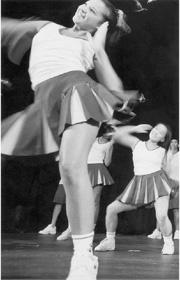WITH TEEN ANGST so pervasive in film this year—sigh, will Johnny Studmuffin take me to the prom?—it’s fitting that a batch of autumn movies should focus on teenagers’ relationships with their mothers. Wayne Wang’s adaptation of the Mona Simpson novel is the first in this fall genre to be released and has the advantage of starring Natalie “Queen Amidala” Portman right after her face has covered everything from Pepsi bottles to mouse pads. (Pedro Almodovar’s All About My Mother comes out next month, along with Gavin O’Connor’s Tumbleweeds and Tod Williams’ gender-bending The Adventures of Sebastian Cole.)
ANYWHERE BUT HERE
directed by Wayne Wang
with Susan Sarandon and Natalie Portman
opens November 12 at Metro, Oak Tree, Pacific Place, and others
When interviewed, Wang told me he wanted to make an accessible mainstream film after his very esoteric Chinese Box (1998), and here he captures a love-hate relationship that, despite some excesses, manages to hit home in the end. Credit goes mostly to Portman, who’s wonderfully versatile and complex as Ann, not missing a beat as she’s repeatedly drawn to and repelled by her overbearing mother. The film opens with Adele (Susan Sarandon) dragging her daughter out of Small Town, Wisconsin, for the glitz of Los Angeles. Beautiful Ann should be a teen actor, she declares in the movie’s best running joke.
OFTEN OVERACTING, Sarandon fills the part of the Midwestern social climber and then some. Her Adele is straight out of an afternoon soap. With her eyes contoured with black liner and red hair lifted higher than a souffl鬠she’s a woman addicted to fantasies of finer things, a schoolteacher who splurges on a Benz, a wife who leaves her loyal husband for a beach stud, a mother who’d rather have her scholarly daughter star in a sitcom. It’s easy to sympathize with the daughter as she says, “Sometimes I couldn’t stand her, sometimes I hated her.”
As you can guess, it’s the daughter who’s the more sensible and “mature” of the duo. Ann points out that Mom needs to pay the bills, that they need the basics—a bed, a desk—instead of new clothes. She’s also the one who sees right through Mom’s one-night stand way before the older woman does.
After all the American Pies and She’s All Thats of the year, it’s refreshing to see such an intelligent, complex teen character. Unfortunately, Wang’s “I-want-to-reach-out-to-the-public” approach often leads to predictable, greeting-card moments; then again, what do you expect from a mother-daughter story not written by Christina Crawford?







